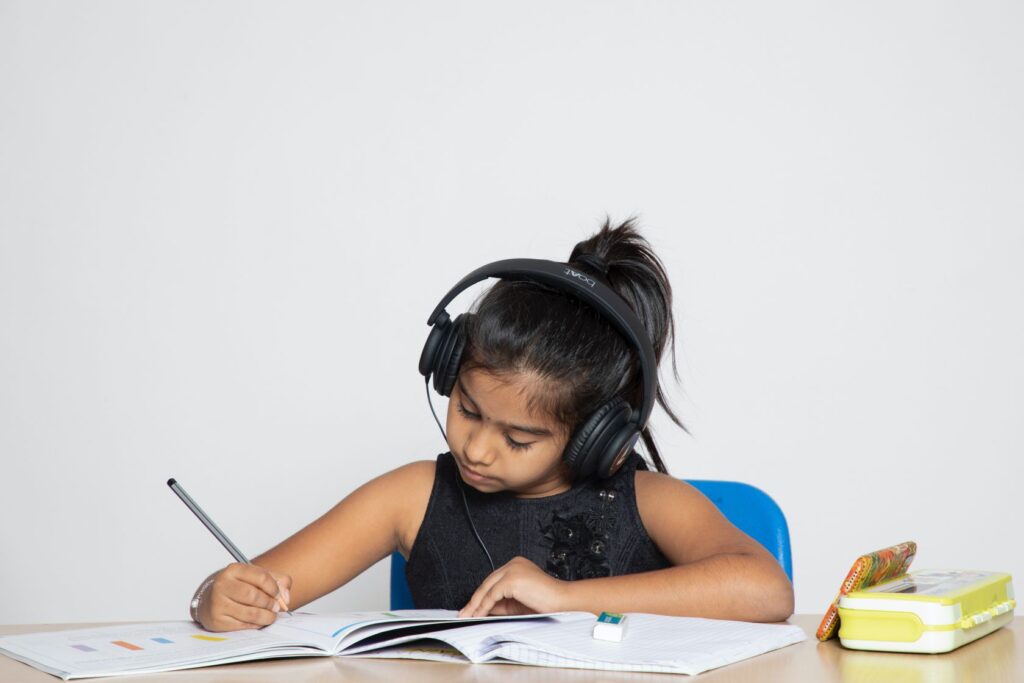Podcasts are a great and convenient way to aid a child’s learning and development. They provide an accessible platform for kids of all ages to discover and explore topics of interest, whether STEM or the arts. Listening to intriguing stories or interviews sparks their imagination and expands their understanding of various concepts.
Furthermore, podcasts are educational activities parents, or teachers can engage in with children. This fosters trust and communication, improves their relationships, and increases knowledge retention for the child. There is a podcast for every goal, whether to learn a language, improve literacy skills or learn about global issues.
Table of Contents
1. Builds Confidence and Literacy
Listening to a podcast about books, literature, characters, etc. positively influences children’s confidence and literacy. It’s an enjoyable learning experience and provides good interaction with a text while stimulating the listener’s imagination. Podcasts enrich classroom activities such as reciting aloud, discussing themes, and analyzing characters. It’s easy to consume books or learn about them through audiobooks and podcasts passively. Listening encourages deep engagement with the material, increasing content retention and appreciation for literature.
2. Present a Broad Array of Narrative Types
Podcasts provide children with a breadth of captivating narratives and educational content. Young listeners can be whisked away to fantastical worlds or explore exciting mysteries in far-off places. They explore topics related to everyday life from diverse perspectives.
Listening to these stories or listening to people talk about interesting matters exposes children to different language models, an expanded range of vocabulary, and a nuanced grasp of the complexity of certain concepts and topics. Moreover, listening to podcasts creates an online engagement platform with other young minds.
3. Availability and Flexibility

Children can use podcasts to stay up-to-date on their favorite topics or explore new interests. The 24/7 availability of podcasts allows kids to educate themselves without relying on traditional teachers and classes. They remove time and location barriers. Parents should use this service to ensure their children access quality educational materials that are difficult to access in other formats.
4. Learn New Languages
Introducing children to foreign languages via podcasts is a great way to develop their language skills. Listening to the age-appropriate audio content in the language they are studying supplements traditional classroom instruction. Podcasts pique children’s curiosity through immersive, interactive stories and playful lessons.
Podcasts are useful for word recognition and teach children how to contextualize words. Kids learn at their speed, rewind, and repeat to develop a natural affinity for the sounds of other languages. Podcasts offer engaging and humorous anecdotes which capture their attention and nurture an interest in learning new words, phrases, and expressions.
5. Stimulates Analytical and Critical Thinking

Listening to podcasts develops children’s analytical and critical thinking skills. Audio education stimulates a child’s imagination more than visuals. Through different topics, children learn the fundamentals of objective interpretation of information. Podcasts encourage dialogue with the listener by prompting questions or having conversations between various guests on the podcast.
Engaging in this type of discourse help children become more aware of both sides of an issue. It unlocks their minds to think critically and come to conclusions on their own. Learning podcasts’ format and presentation style also equips young minds with valuable communication skills that will last a lifetime.
6. Great Educational Resource for Kids with Special Needs
With sound-based learning and written transcripts, a podcast for children offers a comprehensive approach to educating children with diverse backgrounds and abilities. The interactive nature of podcasts lets children explore topics they’re interested in while engaging their auditory and visual senses. Audio learning is three times higher in comprehension for kids than reading.
Parents and tutors can use podcasts to accelerate learning in kids with learning disabilities. These children access information in a safe, comfortable environment free from the pressures of traditional learning environments. Podcasts also provide educational materials in an engaging and easy-to-understand format, like videos or colorful books, without being overly stimulating. This aspect is beneficial to children with ADHD or autism spectrum disorder.
Final Thoughts
Podcasts are important for children’s cognitive growth and development. They can improve listening skills, boost language comprehension and vocabulary, enhance critical thinking, and provide exposure to diverse perspectives and ideas. Podcasts can stimulate a child’s curiosity, imagination, and creativity through engaging and informative content, helping expand their understanding of the world.













